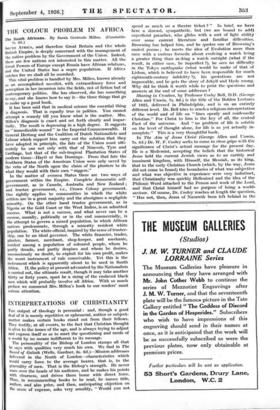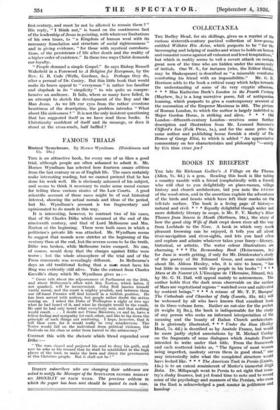INTERPRETATIONS OF CIIRISTIANITY
TEE output of theology is perennial : and, though a good deal of it is merely repetitive or ephemeral, author or subject- matter makes certain books stand out from their fellows. They testify, at all events, to the fact that Christian thought is alive to the issues of the age, and is always trying to adjust and express itself so as to meet the questioning and needs of a world by no means indifferent to its message.
The personality of the Bishop of London stamps all that he says with qualities very much his own. We find in The Sword of Goliath (Wells, Gardner, Els. 6d.)-11Ession addresses delivered in the North of London—characteristics which would carry force, to the average hearer, that is, to the generality of men. That is the Bishop's strength. He never sears over the heads of his audience, and he makes his points With clearness, and drives them home with direct force. Thus, in recommending books to be read, he names title, author, and also price, and then, anticipating objection on the welt of expense, asks very sensibly, "Would you not
spend as much on a theatre ticket ? " In brief, we have here a shrewd, sympathetic, but (we are bound to add) superficial preacher, who glides with a sort of light ability
over some current literature and familiar difficulties. Browning has helped him, and he quotes one of Browning's
easiest poems ; he meets the idea of Evolution more than once with a curious formula about evolving a watch being a greater thing than m iking a watch outright (what if the result, in either case, be imperfect ?), he sees no difficulty in the Tokyo earthquake (what would he make of that of Lisbon, which is believed to have been responsible for much, eighteenth-century infidelity ), his quotations are not impeccable, and lie gets the story of Jekyll and Hyde wrong. Why did he think it worth while to print the questions and answers at the end of some addresses ?
Sharing in Creation, by Professor Cosby Bell, D.D. (George Allen and Unwin, 7s. 6d.) is the title of the Bohlen Lectures of 1925, delivered in Philadelphia, and is on an entirely different level. Dr. Bell tries to reach a religious interpretation of the world and of life on "lines openly and confessedly Christian." For Christ to him is the key of all, the central Fact of the universe. And "no problem of life is soluble on the level of thought alone, for life is as yet actually in- complete." This is a very thoughtful book.
In The Aim of Jesus Christ (George Allen and L'nwin, 7s. 6d.) Dr. W. F. Cooley seeks to come to close grips wall the significance of Christ's actual message for the present day. He is a Modernist, accepting the beliefs that the historical Jesus held the current Jewish views as to an earthly and imminent kingdom, with Himself, the Messiah, as its king, that to the early Christian Church (which, by the way, Jesus did not come to found) the boundaries of what was subjective and what was objective in experience were very indistinct, that Christianity was quickly Hellenized and the idea of the Philonic Word attached to the Person and work of the Lord, and that Christ himself had no purpose of being a world- saviour. Of course, Dr. Cooley reaches at length the question, "Has not, then, Jesus of Nazareth been left behind in the first century, and must he not be allowed to remain there ? " His reply, "I think not," is based on the continuous fact of the leadership of Jesus in pointing, with whatever limitations of his own times, to "a Kingdom of human weal with its necessary foundation and structure of social righteousness" and in giving evidence, "for those with mystical corrobora- tions, of the persistence cf life after death and the reality of a higher order of existence." In these two ways Christ demands our loyalty.
"People demand a simple Gospel." So says Bishop Russell Wakefield in a Foreword to A Religion for Everyman, by the Rev. G. B. Code (Wells, Gardner, 5s.). Perhaps they do, after a perusal of Dr. Cooley. But this little book that would make its brave appeal to " everyman " is rather too familiar and slapdash in its " simplicity " to win quite so compre- hensive an audience. It fails, where so many have failed, in an attempt to sketch the development of the Boy and the Man Jesus. As we lift cur eyes from the rather overdone heartiness of the description, the problem intrudes "What about His sinlessness ? " It is not the only insistent questioning that has suggested itself as we have read these books. Is Christianity confident of itself and its message, or does it stand at the cross-roads, half baffled ?



































 Previous page
Previous page